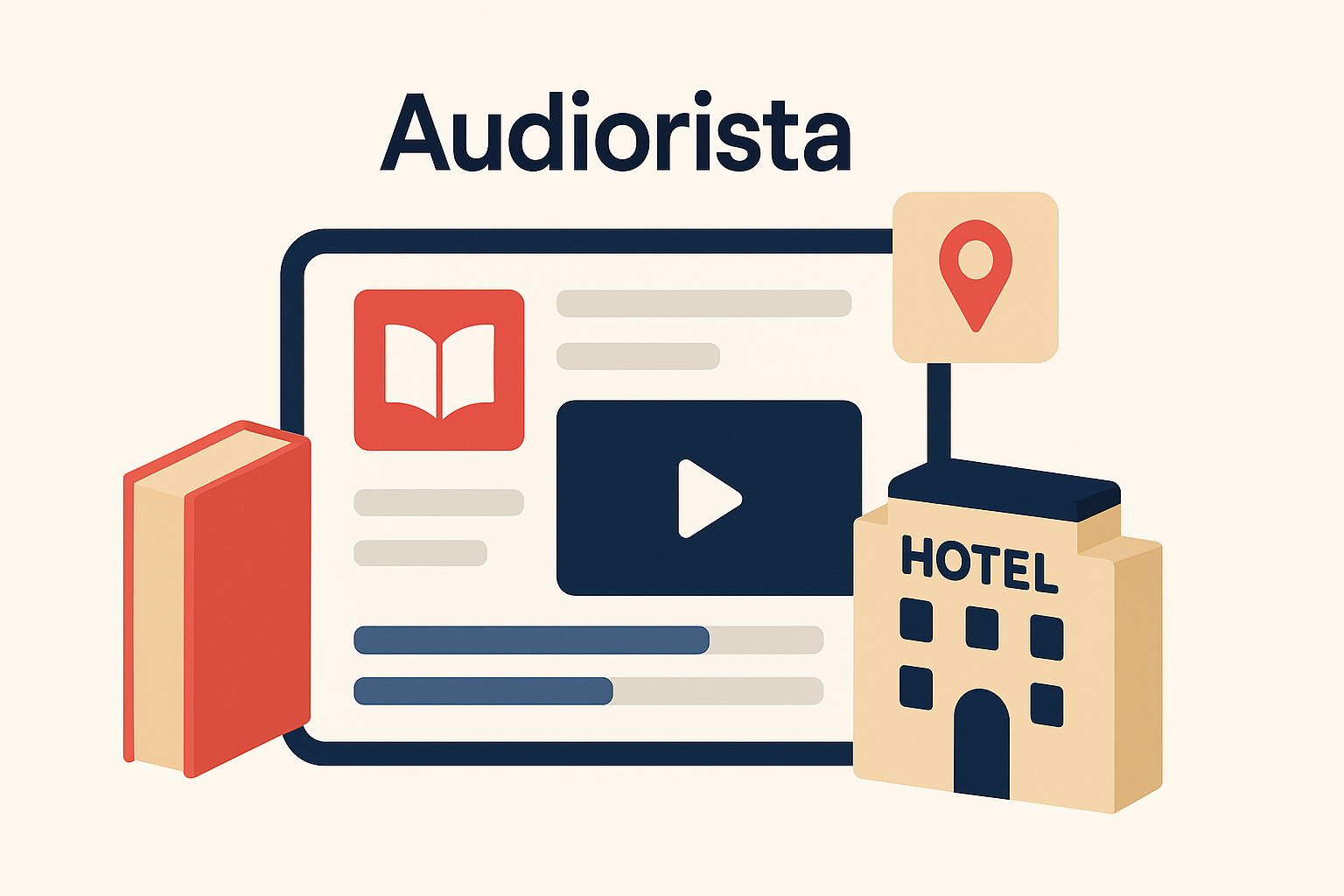Build Your Hospitality and Tourism Education App Easily

The hospitality and tourism industry is evolving fast, and so is the way professionals learn. Educators, trainers, and businesses increasingly need digital solutions that make hospitality and tourism training more accessible, cost-effective, and scalable. Traditional classrooms and in-person workshops no longer meet the demand for flexible, standardized education. The shift is clear: online hospitality training and mobile learning apps are becoming essential tools for delivering consistent knowledge across universities, training programs, hotels, and tourism enterprises.
Audiorista provides a no-code platform designed to help institutions, trainers, and companies build hospitality training apps, tourism learning platforms, and hotel management courses with ease. Using a single solution, you can deliver educational content in audio, video, and text formats directly to learners, while enabling subscription-based access, reducing overall training costs, and improving flexibility for both students and enterprises. In this guide, we’ll explore the benefits, key features, audiences, and use cases for creating a branded hospitality and tourism education app with Audiorista.
Why digital learning matters in hospitality and tourism
Hospitality training and tourism education have long depended on in-person classes, printed materials, and on-site workshops. While these methods are valuable, they present several challenges. Traditional training often comes with high costs, logistical constraints, and limited access for learners in different geographic locations. Knowledge delivery can also vary from instructor to instructor, making it harder to maintain consistent standards across large organizations or academic institutions.
This is where digital hospitality courses offer a clear advantage. Online learning provides standardized content, scalable delivery, and the ability for learners to revisit materials on demand. For enterprises, a digital-first approach means staff can onboard faster with fewer resource constraints. For educators, mobile learning platforms open wider access to students who may not be able to attend in person. The ability to deliver courses directly through a dedicated hospitality education app ensures knowledge is both consistent and accessible—anytime, anywhere.
Features, audiences, and use cases of hospitality education apps
A hospitality and tourism education app brings together several essential features tailored to the needs of both educators and learners. Multimedia learning is at the core—combining video lectures, audio content, and text documents to make training more engaging. This approach accommodates different learning styles while allowing institutions to repurpose existing lecture recordings, presentations, or written modules into a structured platform.
Apps also provide anytime, anywhere access, helping learners engage with materials on their schedules. Customization is another benefit, enabling course providers to design apps that reflect branding, structure, and goals. Subscription-based models create monetization opportunities, building sustainable revenue streams for trainers, consultants, and institutions.
- Educators & Universities – Deliver structured courses and updated materials directly to students through a branded app.
- Trainers & Consultants – Streamline onboarding and training through reusable digital content instead of repeated sessions.
- Enterprises – Ensure consistent staff training across departments and locations, improving efficiency and compliance.
- Students & Professionals – Access flexible learning resources for hospitality management, tourism studies, and career advancement.
Building with Audiorista: The platform makes creating apps simple with its no-code interface and scalable publishing tools. Trainers and institutions can combine audio, video, and text into a cohesive experience, while easily updating and expanding their content libraries. Universities benefit from structured course delivery, while trainers and consultants gain a professional distribution platform without technical hurdles.
Real-world use cases
- Hospitality training app for hotel staff onboarding
- Tourism course app for cultural studies
- Hotel management training app with multimedia
- Subscription-based learning platform
These use cases showcase how versatile hospitality and tourism education apps can be, supporting staff development, academic studies, and professional career growth.
Next steps to building your training app
Launching a hospitality and tourism education app has never been easier. With Audiorista’s no-code platform, institutions, trainers, and enterprises can transform materials into digital learning solutions quickly and efficiently. The growing demand for mobile and scalable training makes this transition essential for the future of education in the hospitality and tourism sectors.
Hospitality and tourism training is moving rapidly toward digital-first solutions, making mobile learning apps an essential tool for educators, trainers, and enterprises. By consolidating video, audio, and text into structured courses, Audiorista’s no-code platform empowers institutions to create fully branded hospitality training apps that scale with ease. For universities, this means consistent course delivery; for hotels and enterprises, it ensures efficient staff onboarding and compliance; and for consultants, it opens new monetization opportunities through subscription-based training. With Audiorista, building a professional hospitality and tourism education app is fast, cost-effective, and designed for long-term impact—helping learners access knowledge anytime, anywhere.
Start building your own branded hospitality and tourism education app today with Audiorista—unlock scalability, consistency, and flexibility without the complexity of coding.


